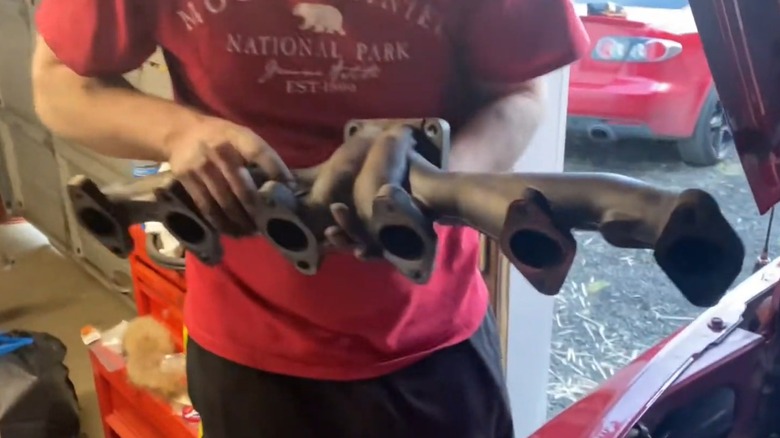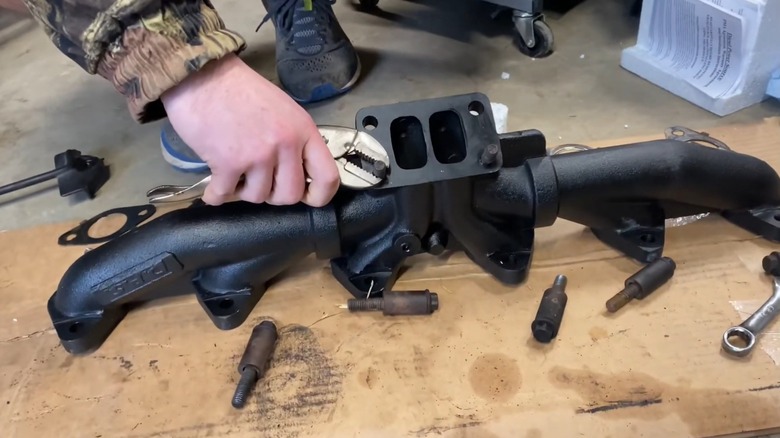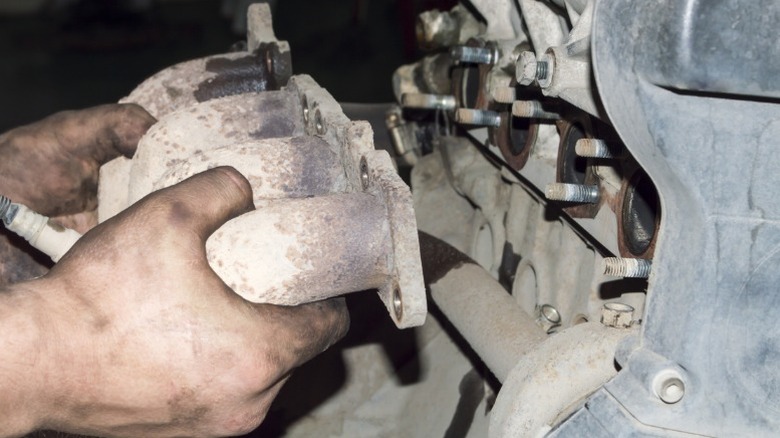If You Run A Cummins Diesel Engine Without An Exhaust Manifold, This Is What Can Happen
The engines that power the vehicles we drive are exceptional machines. They're capable of generating insane amounts of power in a relatively confined space, and they can generally be expected to continue providing that power for many years and thousands of miles. However, an engine doesn't produce all of that power on its own. In reality, it relies on the smooth teamwork of various parts and systems to create power and send it to your wheels. While the air intake and fuel systems are two of the most critical components for an engine's performance, the exhaust system is also more important than you may realize.
Diesel engines, in particular, like the Cummins engines found in Dodge and Ram pickup trucks, often require extra exhaust components to prevent the dumping of harmful emissions into the atmosphere. The exhaust manifold is one of those vital parts and is responsible for routing emissions and exhaust gasses from the engine to the exhaust tubing, catalytic converter(s), and — in the case of modern diesel vehicles — the diesel exhaust fluid (DEF) and selective catalytic reduction (SCR) systems. While many people like to modify their cars' exhaust systems, either to increase the vehicle's performance or make it sound better, you should not remove your diesel engine's exhaust manifold.
Removing the manifold and running your car without it will cause several issues, including an extremely loud engine noise, stinky exhaust fumes, failure to pass an emissions test, and even engine overheating problems. If you want to learn more about why the exhaust manifold is so important, as well as more about the consequences of running your Cummins diesel engine (and other engine types) without one, stick around.
Why is the exhaust manifold important?
Your Cummins diesel engine's exhaust manifold is a critical part of the vehicle's exhaust system. As mentioned, it's responsible for routing exhaust gasses out of the engine's cylinders and into the rest of the exhaust system. That's a vital job for a handful of reasons.
First of all, without the exhaust manifold, the exhaust gasses leaving the engine would build in the engine bay. As those gasses are extremely hot, they can lead to the development of excess heat and engine overheating. It's also critical that those exhaust gasses travel through the proper channels before entering the atmosphere. If allowed to escape into the engine bay, those gasses and the harmful pollutants they contain can not only enter your vehicle's cabin, creating a stinky and dangerous environment for you and your passengers, but they can also poison our air and atmosphere. The exhaust manifold is the first step toward sending those gasses through the catalytic converter(s) and, in the case of modern diesel vehicles, the SCR and DEF systems. Those steps are vital in order to convert toxic pollutants like NOx into less harmful emissions like water vapor and nitrogen.
As mentioned, without an exhaust manifold, your vehicle's emissions will escape into the engine bay, the car's cabin, and the atmosphere. That means that you will also be unable to pass an emissions test if your state requires one. Not only can that make registering your vehicle impossible, it may also put you at risk of legal consequences. Finally, the exhaust system doesn't only address harmful emissions. It also helps dampen noise. If you run your Cummins diesel without an exhaust manifold, the exhaust gasses will not pass through any resonators or mufflers, meaning your vehicle will run extremely loudly.
What about running a gas engine without an exhaust manifold?
Now that you understand the consequences of running your Cummins diesel engine without an exhaust manifold, you may be wondering if the same applies to gas engines. If you assumed that the answer was yes, you would be correct. The exhaust manifold is a vital component for any internal combustion engine, regardless of whether it relies on gas or diesel for fuel.
Running a gas engine without an exhaust manifold will lead to the same problems that you'll experience if you remove the manifold from your Cummins diesel engine. Those exhaust gasses will spill out of the cylinders into the engine bay, your vehicle's cabin, and the atmosphere. That will lead to the same issues we described above, including creating a toxic environment for you and your passengers, contributing to potential engine overheating and damage, as well as preventing you from passing an emissions test and causing your car to run extremely loud.
There's really no reason to remove your vehicle's exhaust manifold, unless, of course, you have to remove it to perform repairs or maintenance. However, you should not run your engine in that state. If you're interested in removing the exhaust manifold or modifying the exhaust system to increase your car's performance, you can opt for a cold air intake and replace the exhaust manifold with a set of aftermarket headers. Installing these components properly can help boost your vehicle's performance and power slightly without damaging the engine, putting you and your loved ones at risk of breathing in harmful toxins, and hurting the environment.


